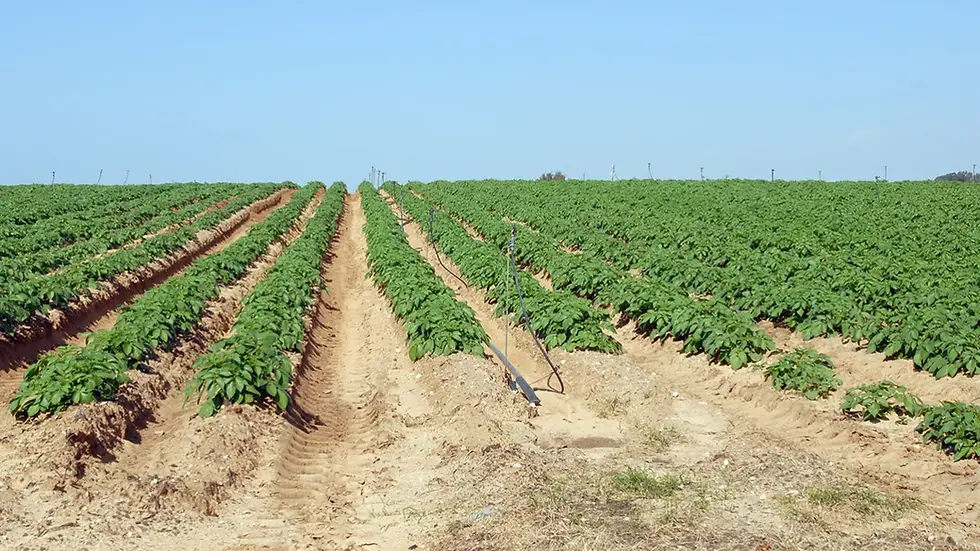The Land Belongs to God
- Rabbi Amy Eilberg
- Jul 7, 2024
- 4 min read
Updated: Jul 9, 2024

Crops growing at Givat Hen in Israel in 2013. (Photo/Wikimedia via PikiWiki CC BY 2.5)
Parashat Behar brings us one of the most transformational visions of human society in the Torah. Its language is legal, but its vision is breathtaking.
First, we find the law of shmita, the sabbatical year. Just as we dedicate the seventh day of the week to rest, restoration and relationship, the seventh year of the agricultural cycle is a sabbath for the land, a time for the earth itself to rest.
This is a glorious image, which is all the more dramatic in our day, in which the Earth is so desperately in need of care. Imagine a year of no tilling or planting, but with plentiful food for all. Comparing this to our time, imagine a year (every seven years!) of no building, no cutting down forests, no spewing pollutants into the already impacted atmosphere. And amid all of this rest, the Torah assures us that everyone will have everything they need.
The shmita year, as described in Deuteronomy 15:1-6 also includes the remittance of debts incurred by Israelites, for money borrowed from other Israelites.
This is hard to transpose into our modern days, in which so many of us owe enormous sums of money to institutions. But the concept is clear. In the seventh year, Israelites are relieved of the burden of indebtedness. In an economic and existential sense, they are set free.
Back in our parashah, the text lays out a poetic cycle of seven cycles of seven years each, culminating in the Jubilee, or Yovel — the 50th year, during which all property returns to its original owner. This is nothing less than a radical economic reorganization of society, in which the usual human mechanisms of ownership are canceled, wiping out the difference between the haves and the have-nots (again, only in Israelite society). If this sounds like socialism, with individual property rights superseded, you are right. But it is more than that. In the Yovel system, society is governed by the fundamental principle that the land does not belong to humans at all, but to God.
Here is the piece that feels most stunning to me right now. In the language of the text, “The land must not be sold in perpetuity, for the land is Mine. You (humans) are but strangers resident with Me.” (Leviticus 25:23)
Remember that this is God speaking to the Israelites about the time when they will have taken residence in the Land of Israel. We know that there are many passages in the Torah about the Land of Israel as God’s gift to the Jewish people, about it belonging to us. How to reconcile the promise of the land with the grand principle, “The land is Mine. You are but strangers and residents with Me”?
Remember, too, that, earlier in Leviticus, God warned, “Do not defile yourselves … for this is how the nations that I am casting out before you defiled themselves. Thus the land became defiled; and I called it to account for its iniquity, and the land spewed out its inhabitants.” (Leviticus 18:24-25)
God warns that the gift of the land to the Israelites is provisional. It is conditioned on the Israelites’ moral behavior, pertaining to care of the land, care of the poor and care of the strangers in their midst. If the Israelites fail to honor their commitments, then the gift is revoked. The text vividly predicts that, if that occurs, the land will “spew out its inhabitants.”
This is one of many passages that feel heartbreaking in our days. We wait and pray for a cease-fire, for the release of the hostages, for a path toward a just resolution of the Israeli-Palestinian conflict (and even, if we dare hope for it, for a way to find resolution with Hamas).
In the meantime, Hamas negotiators are recalcitrant, apparently not caring about the suffering of the people of Gaza. And Israel continues to kill Gazans, a large percentage of them innocents, including women and children. With an increasing international chorus of condemnation even from Israel’s allies, Israel’s government continues to push for more military action, for more violence, for more death and destruction.
Beneath the usual arguments, both sides are effectively screaming, “This land is mine and you can’t have it!” Disturbingly large numbers of both Israelis and Palestinians deny that the other community has a right to this land that they all call home. Both insist that their claim is exclusive and any challenge to it is outrageous and cause for violence.
I can only dream of what would happen if, in a moment of utter exhaustion and despair, leaders of both peoples sat down at a table, perhaps after a good meal and some wine, and said, “You know, the land doesn’t really belong either to us or to you. We belong to this land. But the land belongs to the God that we all worship. Let’s talk about how we could begin to act that way.”
You can say I’m a dreamer. I am deeply heartened by the fact that I am not the only one. We must dream and pray for peace, nourished by the powerful wisdom of our tradition. May our prayers soon come to be.
This post originally appeared in the J Weekly https://jweekly.com/2024/05/23/this-torah-portions-vision-of-economic-reorganization-sounds-a-lot-like-socialism/




Comments